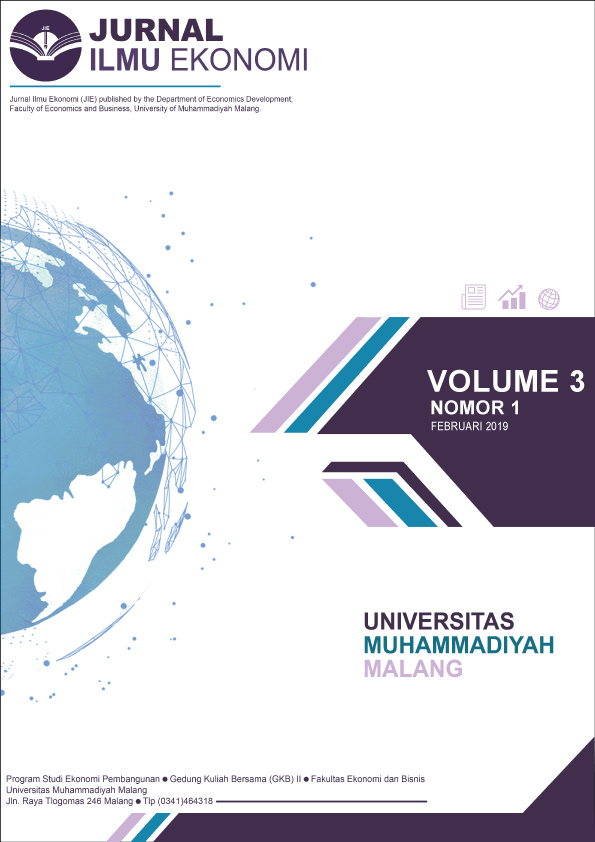ANALISIS POTENSI SEKTOR UNGGULAN DAN PERGESERAN STRUKTUR PEREKONOMIAN DI KABUPATEN/KOTA PROVINSI BANTEN TAHUN 2011-2015
DOI:
https://doi.org/10.22219/jie.v3i1.6065Abstract
This study entitled “Analysis of Potential of Superior Sector and Shifting of Economic Structure in Regencies / Cities in Banten Province Year 2011-2015.The economic growth is a process of changing the economic conditions of a region to a better state in a certain period. In order to carry out development is preferred to sectors that have special quality. The purpose of this research is to know the potential of Superior sector in Regency / City of Banten Province. This research uses panel data from Gross Domestic Product in Regency / City of Banten Province Year 2010-2015. The Analysis tool that used in this research is Location Quotient Analysis and Shift share Analysis.
The result of Location Quotient Analysis can be known that sector which is superior in Regency / City of Banten Province still dominated by Education Service sector. The result of Shift Share Analysis can be seen from structural shift from secondary to tertiary. Then from the Classical SS table, SS Esteban-Marquillas and SS Archelus, that some districts in Banten Province have positive values on special quality competitive and regional specialization. The calculation of economic structure in the Regency / City of Banten Province shows the dominance of the tertiary sectors compared to the primary and secondary sectors.
Keywords: Location Quotient, Superior sector, Shift share.
Downloads
References
Arsyad, L. (2010). Ekonomi Pembangunan Edisi Kelima. Yogyakarta: UPP STIE YKPN.
Erawati. (2011). Analisis Pola Pertumbuhan Ekonomi dan Sektor Potensial Kabupaten Klungkung. Universitas Udayana.
Hasani, A. (2010). Analisis Struktur Ekonomi Berdasarkan Pendekatan Shift Share di Provinsi Jawa Tengah Periode Tahun 2003-2008. Universitas Diponegoro, Semarang.
Kuncoro. (2002). Evaluasi Penetapan Kawasan Andalan: Studi Empiris di Kalimantan Selatan 1993-1999. Ekonomi dan Bisnis Indonesia.
Ramda, E. E., Utama, Made Suyana. (2015). Pergeseran Struktur Ekonomi Dan Potensi Kabupaten Manggarai Periode 2010-2015. Ekonomi Pembangunan.
Sjafrizal. (2008). Ekonomi Regional, Teori Aplikasi. Padang: Baduose Media.
Sukirno, S. (1994). Pengantar Teori Ekonomi Makro. Jakarta: Raja Grafindo Persada.
Taringan, R. (2005). Ekonomi Regional Teori dan Aplikasi Revisi. Jakarta: PT Bumi Aksara.
Todaro. (2000). Pembangunan Ekonomi Jilid 1. Jakarta: Erlangga.
Tuandali, N. F. D., Engka, Deissy S.M Wauran, Patrick C. (2014). Analisis Pergeseran Struktur Ekonomi dan Sektor Kabupaten Halmahera Utara Provinsi Maluku Utara Periode 2010-2014. Ekonomi Pembangunan.
Wulandari, F. N. (2015). Analisis Sektor Unggulan Di Kabupaten Wonogiri Tahun 2011-2015.
Badan Pusat Statistik, Produk Domestik Regional Bruto Atas Dasar Harga Berlaku Menurut Kabupaten/Kota di Provinsi Banten, 2011-2016. diakses 23 September 2017. https://banten.bps.go.id
Published
How to Cite
Issue
Section
License
Authors who publish with this journal agree to the following terms:
- For all articles published in the JIE (Jurnal Ilmu Ekonomi), copyright is retained by the authors. Authors give permission to the publisher to announce the work with conditions. When the manuscript is accepted for publication, the authors agree to the automatic transfer of non-exclusive publishing rights to the publisher.
- Authors retain copyright and grant the journal right of first publication with the work simultaneously licensed under a Creative Commons Attribution-NonCommercial-ShareAlike 4.0 International License that allows others to share the work with an acknowledgement of the work's authorship and initial publication in this journal.
- Authors are able to enter into separate, additional contractual arrangements for the non-exclusive distribution of the journal's published version of the work (e.g., post it to an institutional repository or publish it in a book), with an acknowledgement of its initial publication in this journal.
- Authors are permitted and encouraged to post their work online (e.g., in institutional repositories or on their website) prior to and during the submission process, as it can lead to productive exchanges, as well as earlier and greater citation of published work (See The Effect of Open Access).
This is an open access article and licensed under a Creative Commons Attribution-NonCommercial-ShareAlike 4.0 International License








